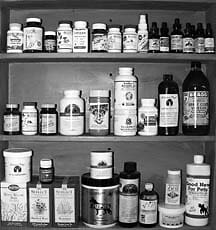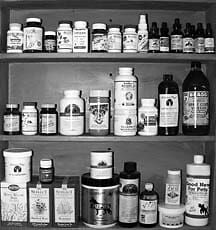Everything I read says give this herb or give that supplement – garlic, lecithin, vitamins, yeast. But what should I give my dog on a regular basis? In order to do everything the books say, I would have to give about 15 pills or supplements. Is it OK to give all that? What is too much?
We turned over this question to Dr. Nancy Scanlan, a veterinarian for 30 years, who has integrated holistic medicine into her practice for 12 years. Dr. Scanlan is also the author of Stop That Itch! Dr. Scanlan’s practice is located in Sherman Oaks, California.
I’m glad the subject of supplements has come up in this general way. As they learn more about nutrition and holistic health care, a lot of dog owners worry that they should be doing more to feed their dogs in the most healthful fashion.

You’re right; if you feed your dog every supplement that you ever hear about or read about, you could very well end up giving the dog 15 different things. You could also inadvertently cause as many problems as you had hoped to solve. And just because you have read an article about the wonders of a certain supplement, doesn’t mean your dog will benefit from that supplement. You have to take these things in context.
Do all dogs need supplements?
There are three main reasons to add specific nutrients to the dog’s diet. The first is to compensate for a known or suspected deficiency of the nutrient in question.
Sometimes, the deficiency is discovered when a blood test is performed for the purpose of analyzing the dog’s nutritional status (although, in my opinion, there are some problems with this methodology (see “Blood Testing for Deficiencies,” next page). In other cases, a dog owner might know that the diet he feeds is deficient in a certain nutrient, and he supplements rather than changes the formulation of the diet. For example, dogs who are fed a diet based on raw meats and vegetables, but who don’t receive fresh ground bones, are more than likely to be deficient in calcium.
When a dog is deficient in a certain nutrient, and he begins to receive the optimum dosage of that nutrient, his health will markedly improve. Sometimes, correcting a deficiency of even a very small nutrient will make improvements in dogs that already seem fairly healthy. Very often you will see that the coat has a better sheen to it, a little bit of dandruff might go away, a greasy coat will turn nicer. The holistic nutritionists say this is because these little micro-minerals have been depleted from the soil, so the grains and animals that are the dog’s major food sources (cattle, sheep, chickens) don’t have them, either. It’s difficult to show deficiencies from these things, because the animals don’t die, they can still reproduce, they look pretty good, they live about the same amount of time. But they will have a little better look and have a little bit more spring to their step if you add it to their diets.
“Optimizing” nutrient levels
The second reason to supplement a dog’s diet is less compelling, but not a bad idea: to cover suspected deficiencies as insurance. Dog food manufacturers will tell you, “We made these foods to contain everything a dog needs, so why are you giving them anything extra?” The answer is, “Because what is now called an ‘adequate’ dosage may not be the optimum dosage.” Many people (including a growing number of veterinarians) feel that the values set forth by the National Research Council for minimum daily requirements of vitamins for dogs are inadequate. The levels for the major minerals seem to be fine.
We know that for humans the minimum daily requirement is not always the optimum daily dosage. It is simply the minimum that is required to keep signs of major deficiencies from appearing. In the human field, many nutritionists now consider the optimum dose for a lot of things, including the “micro” minerals and vitamins, to be about double the minimum daily requirement recommended by the National Research Council.
From my experience, I suspect the same is true of animals. In cats, for example, we know that for years and years we didn’t have a good number for the amino acid taurine; it takes years for signs of taurine deficiency to show up in cats, and it took years and years to prove this. The amount that is recommended now is more than twice what it was in previous years! This can occur because the studies for supplementation are often of a duration that is only long enough to raise an animal from birth to reproductive age and let them have a litter; if all of that works they consider the study sufficient. But some problems take years – or even generations – to show up.
So, in my opinion, giving a dog who eats standard commercial foods a vitamin supplement – one that contains no “mega doses” of any nutrient, and no extra calcium or other minerals – can be a good idea. All good quality commercial dog foods seem to contain sufficient quantities of the major minerals such as calcium, iron, copper, and zinc; I wouldn’t add any without a specific reason.
Therapeutic dosages
The third reason to give a dog supplements is to try to optimize the dosage of certain nutrients for therapeutic or preventive effects. Please note that I used the word optimize, not maximize. Over-supplementation can cause many problems, which I’ll discuss below.
Therapeutic supplementation would include, for instance, feeding a dog with specific health problems – allergies, say – higher doses of those nutrients which can help the body deal with that condition more effectively. For example, giving a dog with pollen allergies extra doses of the antioxidant vitamins C and E during the peak season for those allergens.
Preventive supplementation is an attempt to prevent the onset of disease. However, this only makes sense when the disease is expected, and when that supplement has proven capabilities to help prevent that disease. One example is the use of iodine supplements to prevent hypothyroid disease in Golden Retrievers, among whom the disease is very common.
Problems with dog supplements
Though there are many cases where intelligent and appropriate supplementation literally saved a dog’s life, Unfortunately, there are many ways that people can do actual harm to their dogs with supplements. Here’s a great example: I once saw a dog who had been seen previously by another vet for kidney stones. As we’ve discussed in a previous article (“Urine Trouble,” November 1999), kidney stones can be caused by too-acid urine or too-alkaline urine. First the dog had the kind caused by overly acid urine. The vet changed the dog’s diet so the dog would have more alkaline urine. That went OK for a while, and then the dog got the kind of stones from over-alkaline urine.
Now the vet was up a creek; what can you do if you can’t shift the diet very far in either direction? The vet was so baffled, she decided to get a second opinion and sent the owner and the dog to me. I was puzzled, too, so I started asking a lot of questions. I asked about supplements – and hit the jackpot. She was giving three different kinds of calcium supplements. All we had to do was cut out the calcium supplements and the dog never had a problem again.
Here are the most common mistakes made when supplementing:
• Over-supplementing
One of the most dangerous ways that people can over-supplement is with minerals, especially in growing animals. People can cause all sorts of bone deformities in young dogs by feeding over-doses of calcium, for instance. Also, other minerals can actually cause mineral poisonings if they are over-dosed.
The place where you can get into the biggest trouble is with the minerals that are required in the greatest quantity: calcium, iron, copper, and zinc. Over-supplementation of calcium in the large and giant breeds can cause joints to break down; also, calcium can bind with other minerals and cause problems. I have seen studies with large and giant dogs where they decreased the calcium to where it was just below the amounts in regular pet foods, and have actually had dogs with healthier joints.
I have also seen copper toxicity and zinc toxicity. Copper binds zinc, so sometimes you won’t see copper toxicity, but you will start seeing a zinc deficiency – not because the diet is deficient in zinc, but because the copper is binding up the zinc and interfering with the zinc in the animal’s body.
With other nutrients, diarrhea may be the least of the problems you can get from over-supplementing. If you feed high enough doses of antioxidants, they can actually change from being antioxidants to pro-oxidants. Some of the anti-cancer supplements can be poisonous in high doses.
One of the most common ways that people inadvertently over-supplement is when they feed their dogs one of the “kitchen sink” supplements, one that has everything you have ever heard of in it, and then feed additional single-ingredient supplements as well. You have to read all the fine print, go over the ingredients to make sure that you are not over-supplementing.
Some nutrients do build up in the animal’s system; minerals can cause problems over time. A nice, steady, moderate dose of antioxidants is pretty safe, even for long periods of time, but if you are feeding maximum dosages for enough time, they can actually promote cancer.
• Imbalances
Some nutrients have to be fed in a proper ratio to another nutrient, or it can cause imbalances that can harm the dog. The best known example is the calcium/phosphorus ration, which should be between 1–1 and 2–1. If it’s not, it can cause rickets in young growing animals, and “rubber-jaw” or osteoporosis in the older dogs.
• Negative Interactions
Very dangerous drug interactions can result from mixing certain medicinal herbs with certain medications. To use both types of medicine safely, you have to consult someone who is familiar with both the drugs and the herbs. One example is willowbark, which interacts with aspirin and also with butazolidin and Rimadyl, and causes what is essentially an aspirin overdose, with intestinal and/or stomach bleeding. Vitamin E and Digoxin (Digitalis) also interact badly; vitamin E can cause a Digitalis overdose, even when the animal is receiving a normal dose of Digitalis.
• Long-term effects
Artificially supplementing an animal with certain nutrients – especially if you are using the maximum recommended amounts – can cause the animal to cease its own production of the nutrient. For instance, dogs manufacture their own vitamin C. If you feed a dog a maximum dose of vitamin C daily, the dog will stop making its own vitamin C. And if you were to suddenly stop that maximal dose, you might even see a temporary case of scurvy!
Managing dog supplements
To supplement intelligently, you have to understand exactly what is in each supplement you feed, and have compelling reasons to feed it. A lack of knowledge can lead to all kinds of problems. For instance, I saw a lady who had an arthritic dog. She had read about the benefits of GAG supplements, and had accordingly bought five different kinds – and was feeding all of them to the dog. An excess of glucosamine will sometimes cause an upset stomach, and sure enough, her dog’s appetite had decreased. Plus, she was wasting an awful lot of money.
When considering giving supplements to your dog, you have to ask yourself, “What is going on with this dog?” and prioritize the issues. If you have a basically healthy animal and your major concern is disease prevention, then you would take one path. If your dog has cancer, or a genetic predisposition to cancer, you would take a different supplementing path. If your dog has terrible arthritis, then concentrate on the supplements that can help with that.
Basic supplement rationale
In general, if your dog is less than six years old and seems basically healthy, there are just a couple of things I would recommend. The first is a trace sea-mineral supplement that supplies the tiny little trace minerals that are no longer present in our soils; these are not the ones that appear on anyone’s list of “required” nutrients. (There are two products I like: one is Source, the other is one I helped PetNutrition develop called “Life Energy Supplement.” The other types of supplements that are helpful for most dogs are digestive enzymes and probiotics like acidophilus. I think most dogs do better if they have the digestive enzymes all the time; I suggest adding probiotics occasionally.
If the dog is more than six years old, then you should start thinking about warding off degenerative conditions (arthritis and joint problems) that start happening at about that time. That’s when I tell people to consider giving a glycosaminoglycan (GAG) supplement, and vitamin C and E.
Outside of these basic suggestions, I give additional supplements only to dogs with problems. For example, if your dog has intestinal trouble, you might want to think about probiotics and/or digestive enzymes. If there is any problem involving anemia, then a B-complex would be a good thing to add. Supplements for treating cancer should be given only to dogs with cancer.
Then there are health problems that are more complex, that are related to the dog’s general level of wellness. The theme here is to do the fewest number of things that will have the most benefit. In these cases, it’s always advantageous to add antioxidants, especially vitamins C and E. Fatty acids, especially the Omega-3 fatty acids, are often lacking in prepared foods, and are helpful for many conditions, including any skin and heart problems, cancer prevention, circulation, and problems with the nails.
Vitamin C has numerous benefits and can help many diseases and prevent other diseases, so that’s a good one to add. But if you look at something like IP6, which has recently shown to have an anti-cancer benefit, with some other benefits suspected but not proven, then I wouldn’t add that unless your dog has cancer. Don’t add supplements unless you have a specific reason for doing so.
Say you have an older, arthritic, cancerous dog. If an animal has multiple ailments, then multiple supplements may be good. It should definitely receive more supplements than a young, healthy animal.
However, even if you have the best reasons in the world for adding a lot of things to an individual’s diet, you will run into certain problems. For example, you can make a dog refuse to eat if his meals are overly laden with all sorts of supplements. Also, you can cause digestive upset – nausea, vomiting or diarrhea – with a lot of supplements; this happens with chronically ill human patients, as well.
Again, try to at least get the things that will do the maximum good into the dog, those supplements that can help with all the dog’s symptoms. And start with the things that are research-proven, like glucosamine for joints. Address the conditions that are more likely to threaten the life of the dog. Fighting a life-threatening cancer tumor may be more important than fighting arthritis, for example. And then, if you still need more, you can gradually add them in. But give everything enough time to start working before you add the next thing in, depending on the supplement, between a week and a month.
Most importantly, I suggest working closely with your veterinarian when making decisions about supplements. If your vet is resistant to the idea of using any supplements, don’t be surprised; many veterinarians have so little experience with nutrition that they just don’t know how to deal with the concept. Find a different vet, one who has advanced education and experience in nutrition, if possible.
The use of “nutraceuticals” to influence your dog’s health can be powerfully positive or negative. Make sure you have someone who can help you best utilize this powerful tool, keep a close eye on your dog for signs that your approach is working or failing, and change it accordingly.







I like how you mentioned that supplements are typically used to help add nutrients where they may be lacking. One of my friend’s dog doesn’t eat the best stuff, so he may benefit from getting supplements. Thanks for the great information on choosing pet supplements.
Any recommendations for an epileptic 7 year old husky ?
I want to support his liver since he is on phenobarbital. He is also on bromide and zonisamide. My vet isn’t too knowledgeable on holistic supplements and I don’t want to give him anything that would contraindicate with his meds.
Hi, the Source link is coming up with an error when clicking on Source in the recommended trace mineral area. Also having a difficult time finding PetNutrition Life Energy supplement.
Can I give my Maltipoo Nutra Thrive he is also taking Thyroid 0.1mg, levothyroxine twice daily. I so concerned because he has gained weight, fatigue, doesn’t want to play and looks depressed.
I feed him 1/4 cup of Dish by Nutrish morning and night. What can I do to help my dog.
I’m glad you talked about dog supplements and how they work. Recently, my wife and I rescued a dog from the streets. We want to help him get back on his paws, so we’ll be sure to look into additional supplements. Thanks for the information on dog nutrients deficiency and how to reverse it.
We have a 22 month boxer that has hair lost behind his ears. We have tried Pro plan sensitive stomach salmon and turkey and he throws them both up. What supplement would you recommed for hair growth and sensitive stomach?